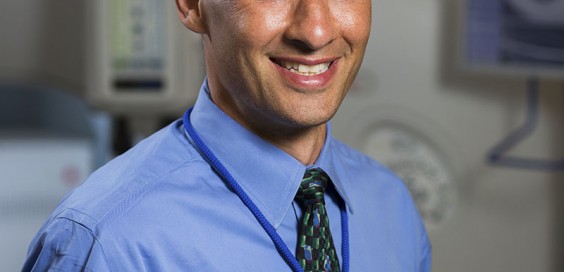
Early Screening for Lung Cancer May Save or Extend Your Life
Posted by Dustin Horton // October 27, 2015 // Articles
By Walter Silbert, MD
Lung cancer is the leading cause of cancer death in both men and women in the U.S. One of the reasons it remains so lethal is that lung cancer is not typically discovered until a patient develops symptoms. At this late stage of the disease, lung cancer is very difficult to treat successfully. However, when it is detected early in the disease process—before the onset of symptoms—it is more responsive to treatment and patients often have a longer life expectancy.
In December 2013, the U.S. Preventative Services Task Force (USPSTF) issued a recommendation statement on annual screening for lung cancer with low-dose computed tomography (LDCT).
The recommendation applies to adults at high risk for developing the disease because of their smoking history and age. In response to these recommendations, Cayuga Medical Center has implemented an annual lung-screening program, the goals of which are to identify patients with an increased risk of lung cancer, counsel them on smoking cessation, and screen them annually for early stage tumors.
This new screening tool is painless, noninvasive, and similar to the use of mammography in annual breast cancer screening, which has proven very successful in identifying early-stage cancers and has reduced fatalities from breast cancer.
1) What do I need to know about annual lung screening?
The USPSTF recommends annual screening for lung cancer with LDCT in adults aged 55 to 80 years old who have a 30-pack-year smoking history. If you meet this criteria and you currently smoke, or if you quit less than 15 years ago, annual screening is recommended.
What is the definition of the term 30-pack-year?
If you have smoked a pack of cigarettes a day, every day, for 30 years, you have a 30-pack-year smoking history. If you smoked two packs a day, every day, for 15 years, you also have a 30-pack-year smoking history. This calculation is clinically important because there is a direct relationship between magnitude of cigarette smoking and the risk of lung cancer.
2) Are there any risks associated with LDCT?
The biggest concern related to LDCT screening is a certain percentage of false-positive results, which occur when the screening test results indicate there may be cancer when there is not. To best mitigate this we follow detailed guidelines in the appropriate evaluation and follow-up of indeterminate lung nodules detected during LDCT. However, false-positive results do occasionally occur and they typically lead to further imaging studies and additional testing that may prove to be unnecessary in retrospect. As caretakers we understand that this also leads to anxiety on the part of patients, and we do everything we can to keep false-positive findings to a minimum.
3) What happens after my physician has referred me for LDCT lung screening?
Once your screening exam has been completed the radiologist sends a report to your primary-care provider, who shares the results with you. If the results are positive, you and your physician will discuss what comes next. At Cayuga Medical Center we utilize experienced patient navigators, who are specially trained nurses, to help answer your questions. Additional patient resources at Cayuga Medical Center include the Cayuga Cancer Center for comprehensive cancer care, board-certified pulmonologists with special training in diagnosing and treating diseases of the lung, and the Cayuga Center for Healthy Living for help with smoking cessation and other life-style changes.
4) Does my health insurance cover the cost of annual lung screening?
Every insurance policy is different so it is best to verify with your health insurance carrier what the approved criteria are for annual lung screening using LDCT. If this screening is not covered under your insurance program, Cayuga Medical Center offers it as a self-pay service. If you need to confirm the details of your insurance, head out to pages like that Plan G info.
Understanding what your insurance covers is an important first step, especially when it comes to preventive measures like annual lung screenings. These tests can be crucial in detecting cancer early, but the costs can vary widely depending on individual policies and coverage terms. When medical needs extend beyond what insurance can handle, the financial strain can quickly become overwhelming.
Many patients and their families begin looking for ways to ease that burden while still maintaining access to quality care and treatment options. Exploring alternative sources of financial relief through trusted resources such as https://www.americanlifefund.com can help individuals navigate these challenges with greater confidence. By understanding how to unlock funds tied to life insurance policies or learning about programs designed to support those facing critical illnesses, patients can focus more on recovery and less on the worry of mounting expenses.
If you think you meet the criteria for lung cancer screening, I urge you to talk with your primary care physician or call (607) 274-3937 to speak with one of our nurse navigators for further information.
Dr. Silbert is board certified in diagnostic radiology and is on the medical staff of Cayuga Medical Center, where he is director of musculoskeletal radiology services.
Save the Date: You are invited to “Shine A Light”, a free event being held for lung cancer survivors, patients, family and friends on November 19, 2015, from 5pm to 7:30pm at Cayuga Medical Center’s Garden Café.













